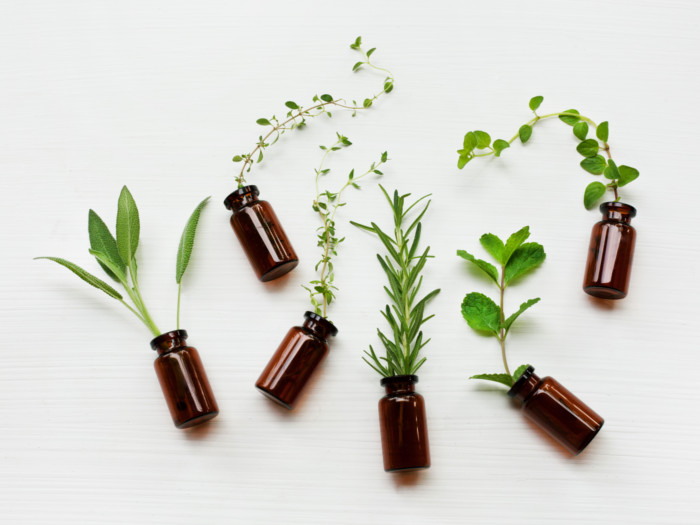The best essential oils to help balance hormones and increase wellness are clary sage oil, lavender essential oil, geranium oil, and Japanese cedarwood oil. Research shows that these oils can help regulate certain hormone activity and can even help alleviate depression. Let’s find out more about essential oils for hormonal balance.
Best Essential Oils for Hormonal Balance
Let us look at the top essentials oils that can restore and maintain hormonal balance, according to evidence-based facts.
Clary Sage Oil
Clary sage oil has been traditionally used to help soothe stressed nerves. In a study published in Phytotherapy Research that involved 22 menopausal women in their 50s, cortisol levels decreased by as much as 36 percent after inhaling clary sage oil. Additionally, serotonin – a hormone that plays a key positive role in mood balancing – increased on exposure to the oil. Clary sage oil, when massaged on the lower abdomen daily, can also help ease menstrual cramps. A preliminary controlled clinical study, published in the Evidence-Based Complementary and Alternative Medicine journal, found that aromatherapy massage with clary sage and other oils was more effective for menstrual pain than acetaminophen. [1] [2] [3]

Be careful when using essential oils as they can be potent. Photo Credit: Shutterstock
Lavender Essential Oil
Research has shown that lavender essential oil has anxiolytic properties. A 2019 animal model of chronic administration of high dose corticosterone showed that lavender oil aromatherapy can alleviate symptoms of depression. There have been other scientific reports that have suggested that lavender can help enhance mood. For instance, a report published in Physiology & Behavior revealed that the essential oils of lavender and orange reduced anxiety and improved mood in people who were waiting for dental treatment. Also, clinical trial research on older women with acute coronary syndrome, who were given reflexology massage with lavender essential oil, showed a drop in systolic blood pressure, diastolic blood pressure, mean arterial pressure, and heart rate. [4] [5] [6]
Geranium Oil
Geranium oil, with its soft floral scent, may help ease symptoms in menopausal women as well as balance their reduced estrogen levels. A 2017 study, published in the Neuro Endocrinology Letters, suggested that the oil may have the potency to improve estrogen secretion in women. In another study, 120 menopausal women were given geranium aromatherapy massage once a week for 30 minutes, for a period of 8 weeks. Researchers found that geranium oil helped ease depression in menopausal women. [7] [8]
Japanese Cedarwood Oil
Japanese cedarwood oil has a spicy, woody aroma. A 2017 study, published in the International Journal of Environmental Research and Public Health, showed that the volatile compounds of Japanese cedarwood essential oil impacted the endocrine system and regulated stress responses. The Japanese researchers found that the essential oil of Japanese cedar wood increased DHEA levels in employees who were doing monotonous work and improved their mental health. DHEA is a naturally produced hormone that is a precursor to sex hormones. It is widely taken as a supplement to slow the aging process and to improve endurance levels. [9]
While these are the best essential oils for hormonal balance, peppermint oil, orange oil, and clove oil also help improve mood and decrease stress in the body. However, there are no studies as yet to verify this.
Word of Caution: Researchers at the National Institute of Environmental Health Sciences (NIEHS) found that chemical compounds in lavender and tea tree oil can cause disruptions to the endocrine system. However, the research is not published in any peer-reviewed journal and needs further verification. [10]
It is advisable to seek advice from an aromatherapist about essential oils. Also, always inform your primary care physician about the usage of essential oils as they may not complement other medications.
